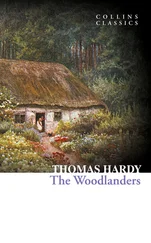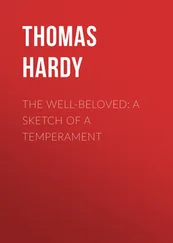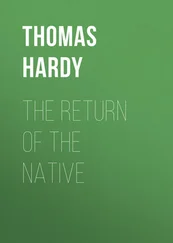"What—it wasn't your own?" he said, with a sudden distaste for her.
"Oh no—it never is nowadays with the better class."
"Nonsense! Perhaps not in towns. But in the country it is supposed to be different. Besides, you've enough of your own, surely?"
"Yes, enough as country notions go. But in town the men expect more, and when I was barmaid at Aldbrickham—"
"Barmaid at Aldbrickham?"
"Well, not exactly barmaid—I used to draw the drink at a public-house there—just for a little time; that was all. Some people put me up to getting this, and I bought it just for a fancy. The more you have the better in Aldbrickham, which is a finer town than all your Christminsters. Every lady of position wears false hair—the barber's assistant told me so."
Jude thought with a feeling of sickness that though this might be true to some extent, for all that he knew, many unsophisticated girls would and did go to towns and remain there for years without losing their simplicity of life and embellishments. Others, alas, had an instinct towards artificiality in their very blood, and became adepts in counterfeiting at the first glimpse of it. However, perhaps there was no great sin in a woman adding to her hair, and he resolved to think no more of it.
A new-made wife can usually manage to excite interest for a few weeks, even though the prospects of the household ways and means are cloudy. There is a certain piquancy about her situation, and her manner to her acquaintance at the sense of it, which carries off the gloom of facts, and renders even the humblest bride independent awhile of the real. Mrs. Jude Fawley was walking in the streets of Alfredston one market-day with this quality in her carriage when she met Anny her former friend, whom she had not seen since the wedding.
As usual they laughed before talking; the world seemed funny to them without saying it.
"So it turned out a good plan, you see!" remarked the girl to the wife. "I knew it would with such as him. He's a dear good fellow, and you ought to be proud of un."
"I am," said Mrs. Fawley quietly.
"And when do you expect?"
"Ssh! Not at all."
"What!"
"I was mistaken."
"Oh, Arabella, Arabella; you be a deep one! Mistaken! well, that's clever—it's a real stroke of genius! It is a thing I never thought o', wi' all my experience! I never thought beyond bringing about the real thing—not that one could sham it!"
"Don't you be too quick to cry sham! 'Twasn't sham. I didn't know."
"My word—won't he be in a taking! He'll give it to 'ee o' Saturday nights! Whatever it was, he'll say it was a trick—a double one, by the Lord!"
"I'll own to the first, but not to the second… Pooh—he won't care! He'll be glad I was wrong in what I said. He'll shake down, bless 'ee—men always do. What can 'em do otherwise? Married is married."
Nevertheless it was with a little uneasiness that Arabella approached the time when in the natural course of things she would have to reveal that the alarm she had raised had been without foundation. The occasion was one evening at bedtime, and they were in their chamber in the lonely cottage by the wayside to which Jude walked home from his work every day. He had worked hard the whole twelve hours, and had retired to rest before his wife. When she came into the room he was between sleeping and waking, and was barely conscious of her undressing before the little looking-glass as he lay.
One action of hers, however, brought him to full cognition. Her face being reflected towards him as she sat, he could perceive that she was amusing herself by artificially producing in each cheek the dimple before alluded to, a curious accomplishment of which she was mistress, effecting it by a momentary suction. It seemed to him for the first time that the dimples were far oftener absent from her face during his intercourse with her nowadays than they had been in the earlier weeks of their acquaintance.
"Don't do that, Arabella!" he said suddenly. "There is no harm in it, but—I don't like to see you."
She turned and laughed. "Lord, I didn't know you were awake!" she said. "How countrified you are! That's nothing."
"Where did you learn it?"
"Nowhere that I know of. They used to stay without any trouble when I was at the public-house; but now they won't. My face was fatter then."
"I don't care about dimples. I don't think they improve a woman—particularly a married woman, and of full-sized figure like you."
"Most men think otherwise."
"I don't care what most men think, if they do. How do you know?"
"I used to be told so when I was serving in the tap-room."
"Ah—that public-house experience accounts for your knowing about the adulteration of the ale when we went and had some that Sunday evening. I thought when I married you that you had always lived in your father's house."
"You ought to have known better than that, and seen I was a little more finished than I could have been by staying where I was born. There was not much to do at home, and I was eating my head off, so I went away for three months."
"You'll soon have plenty to do now, dear, won't you?"
"How do you mean?"
"Why, of course—little things to make."
"Oh."
"When will it be? Can't you tell me exactly, instead of in such general terms as you have used?"
"Tell you?"
"Yes—the date."
"There's nothing to tell. I made a mistake."
"What?"
"It was a mistake."
He sat bolt upright in bed and looked at her. "How can that be?"
"Women fancy wrong things sometimes."
"But—! Why, of course, so unprepared as I was, without a stick of furniture, and hardly a shilling, I shouldn't have hurried on our affair, and brought you to a half-furnished hut before I was ready, if it had not been for the news you gave me, which made it necessary to save you, ready or no… Good God!"
"Don't take on, dear. What's done can't be undone."
"I have no more to say!"
He gave the answer simply, and lay down; and there was silence between them.
When Jude awoke the next morning he seemed to see the world with a different eye. As to the point in question he was compelled to accept her word; in the circumstances he could not have acted otherwise while ordinary notions prevailed. But how came they to prevail?
There seemed to him, vaguely and dimly, something wrong in a social ritual which made necessary a cancelling of well-formed schemes involving years of thought and labour, of foregoing a man's one opportunity of showing himself superior to the lower animals, and of contributing his units of work to the general progress of his generation, because of a momentary surprise by a new and transitory instinct which had nothing in it of the nature of vice, and could be only at the most called weakness. He was inclined to inquire what he had done, or she lost, for that matter, that he deserved to be caught in a gin which would cripple him, if not her also, for the rest of a lifetime? There was perhaps something fortunate in the fact that the immediate reason of his marriage had proved to be non-existent. But the marriage remained.
The time arrived for killing the pig which Jude and his wife had fattened in their sty during the autumn months, and the butchering was timed to take place as soon as it was light in the morning, so that Jude might get to Alfredston without losing more than a quarter of a day.
The night had seemed strangely silent. Jude looked out of the window long before dawn, and perceived that the ground was covered with snow—snow rather deep for the season, it seemed, a few flakes still falling.
"I'm afraid the pig-killer won't be able to come," he said to Arabella.
"Oh, he'll come. You must get up and make the water hot, if you want Challow to scald him. Though I like singeing best."
Читать дальше












